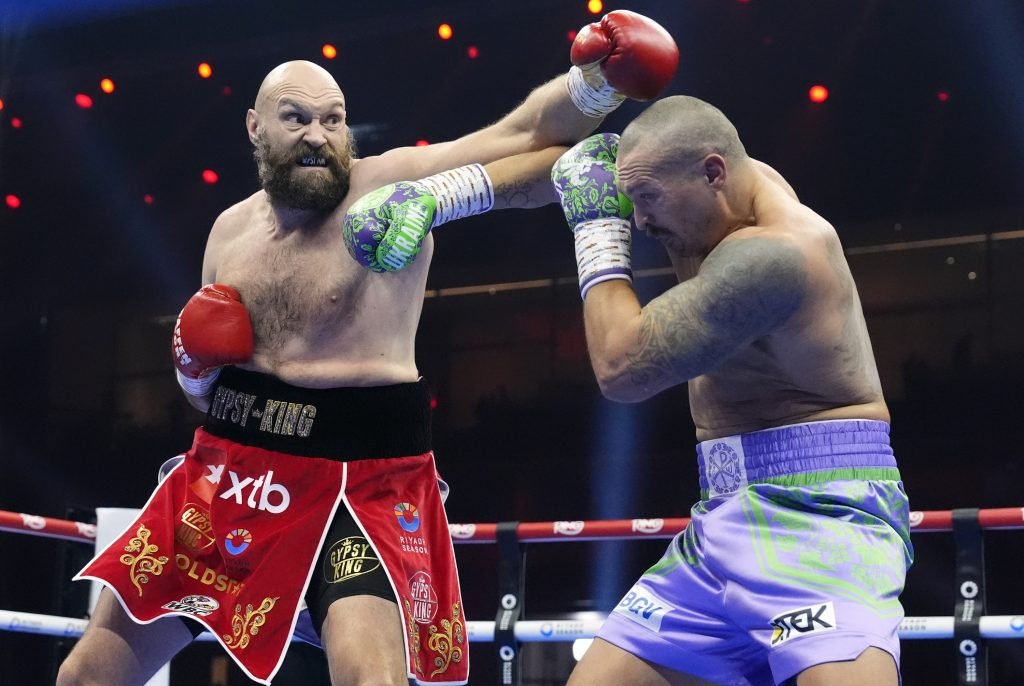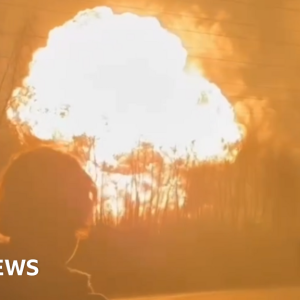
Tyson Fury once broke an opponent’s spirit with a story. He was set to fight Wladimir Klitschko, who’d been in possession of at least one major heavyweight belt for a full decade, looking near invincible throughout his run. Few expected Fury to do much before getting knocked out. Then, in a sit-down face-off, Fury recounted a tale of a long-ago training camp in which he outlasted Klitschko in a sauna, making it out to be a battle of wills. Just before Fury revealed that Klitschko departed the hot box first, Wlad gulped like somebody was holding him at gunpoint. Fury was equally effective in the ring, so bamboozling Klitschko with feints and twitches that the longtime champion seemingly forgot to throw punches. Fury won, then rubbed a tub of salt into the wound by serenading his wife with a harrowing version of Aerosmith’s “I Don’t Want To Miss a Thing.” Klitschko stood feet away, perhaps daydreaming of new career paths and better singers.
Fury figured never to meet an opponent he couldn’t out-talk. He approached the brash knockout artist Deontay Wilder with a furious torrent of psychological warfare, then knocked him out twice in their trilogy. He surely has said the word “dosser” more than any other boxer, or Earth resident. He could be at turns nasty, earnest, bigoted, kind, or silent, but he inevitably snuck into his foes’ heads and mangled their brains before he even started punching them.
Then came Oleksandr Usyk.
Usyk wasn’t even on Fury’s radar. He fought at cruiserweight until 2018; once he cleared out the other 200-pounders and moved up to heavyweight, most still thought he would fall before reaching the final boss. Even if he overcame the initial hurdles, Fury had six inches in height, seven inches in reach, and a few dozen pounds on him. But Usyk twice beat Anthony Joshua, whom Fury long had his eye on, and took AJ’s three belts. He was ready and willing to take the fourth from Fury despite the comical size difference.
Fury began messing with Usyk immediately. The first time a Fury-Usyk fight was mooted, Fury launched a trademark profane rant into Usyk’s face. But Usyk refused to engage, staring at him with a slight grin on his face. Fury cycled through his rolodex of insults and couldn’t get a reaction. Slowly he ran out of juice, allowing uncertain pauses into his typically ceaseless stream of bile. “You’re gonna do something!” Fury yelled. “Are you gonna do something?”
Usyk did: by refusing to play Fury’s game. Each time Fury railed at him, Usyk either let him talk himself out, or responded as if Fury was a hyperactive child (which he kind of is). He even maintained his restraint once they fought. When Fury showboated in the first round of their May 19 clash, placing his arms on the ropes and baying to the crowd, Usyk retreated to the middle of the ring like a parent waiting for their kid to burn off a sugar rush.
While Fury clowned, Usyk focused on the fight. Though he lacks knockout power, Usyk consistently forces opponents to work at a rate just above their comfort threshold, like a treadmill that operates faster than a runner’s ideal pace. Fury had plenty of success in the first six rounds he fought with Usyk, but expended a disproportionately large percentage of his gas tank, leaving him vulnerable late. In the ninth round of that May fight, Usyk found Fury’s chin with his most vicious left hand of the night. It switched the lights out for a split second and Usyk followed up, landing a handful of clean shots on a wobbling, half-conscious Fury and eventually knocking him down. Usyk hunting the wounded giant became the defining moment of the fight, visually and on the scorecards: The extra point he earned with the knockdown made up his winning margin on the tiebreaking scorecard.
With Fury’s undefeated record gone after 36 fights and 36 years, he tried to reinvent himself and the narrative. He thrust himself into a barebones training camp in Malta, unilaterally sequestering himself from any contact with his family. He scaled back his aimless rants and tried to rationalize his defeat, emphasizing his early success and spinning Usyk’s near-knockout in the ninth round into an argument that Usyk had a golden opportunity to stop him and couldn’t. His team explained that he’d been unable to spar prior to the first fight for fear of reopening a cut.
Saturday in Riyadh, Fury did indeed improve on his performance from the first fight. He kept his right hand pinned to his cheek to block Usyk’s stinging left. He avoided exchanging with Usyk at midrange, either operating behind his long jab or bumrushing Usyk, flinging out a quick punch before leaning all 280 pounds of his bulk on Usyk to tire him out and smother counter-fire. Fury cut out showboating entirely, and more crucially, dodged the demonic punches that scrambled his senses in the first fight. He even banished his father from his corner, after the notorious Big John had sown discord in the first fight by talking over Fury’s trainers. Fury has weathered a tumultuous career, overcoming long tussles with depression and drugs to make it back into the ring. This was likely his most disciplined performance yet.
And all for naught on the scorecards. Usyk won again, this time by unanimous tallies of 116-112, still finding a way to gas Fury out despite his newfound focus. This time, Usyk accelerated after the fifth round, in which Fury landed thumping uppercuts and looked as imposing as the Death Star lumbering toward Alderaan. Seemingly in trouble, Usyk successfully ensured Fury never had control again. His punches carried a vicious snap. He raided Fury’s body, then directed his attacks at Fury’s bearded dome when he’d softened up the midsection. Usyk set his pace subtly, constantly repositioning his feet to pressure the big man rather than through sheer volume of punches. Though Fury remained competitive, Usyk had the upper hand throughout the second half of the fight. Fury spent the dregs of his energy in the final round, charging forward more recklessly and swinging from his shoes. Usyk refused to bend, even though, in hindsight, he could have: His lead on the scorecards was enough that he could have been knocked down and it would have had no bearing on the final result.
Usyk opponents can probably find comfort in the fact that he will go down as one of the greatest fighters to ever do it. He is 23-0 now, his record studded with wins against all the best available cruiserweights and heavyweights. He has enjoyed multiple stints at No. 1 on pound-for-pound rankings, is either the best cruiserweight of all time or second only to Evander Holyfield, and has slotted himself somewhere on the list of legendary heavyweights after just seven fights. God knows what his ceiling is, since he’s duly produced an extra gear every single time an opponent forced him to. It is a pity that Usyk is not a household name—he supplements his skills with a bizarre, wholesome personality that is decidedly less toxic than Fury’s. The baddest man on the planet beats up dudes 50 pounds bigger than him then cries next to his daughter’s stuffed animal that he has brought to the press conferences. He’s pretty cool.
I suspect Fury will struggle to deal with being humbled by two consecutive losses, even at the hands of such a quality rival. When Fury reigned at his peak, plenty of people argued that his peculiar mix of size and skills might just have unraveled any heavyweight in history: Frazier, Foreman, Ali, anybody. Now Usyk has twice established that Fury is not even the best heavyweight in his own generation. Your average grounded human being can process failure after doing their utmost, and find little shame in losing to the best. But Fury’s very identity is tied to supremacy. Though he has a history of under-training for fights against lesser opposition, he still won those fights. Failing this time despite training his hardest should challenge his most deeply held certainties. If I’m not the best, what am I?
Rather than enter a public existential crisis immediately after the fight, Fury bailed from the ring as Usyk took questions. He didn’t stay silent for long, already insisting, as he stalked back to his locker room, that he deserved the decision. But the image of him slipping out of the ring felt more telling. The big talker finally had nothing left to say.






